Objets Κέντρον Ερεύνης Ελληνικής Φιλοσοφίας
<< 10
10 >>
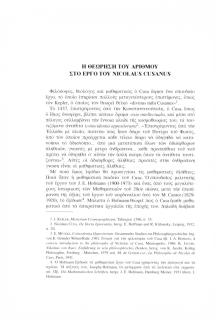
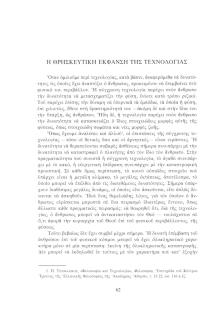
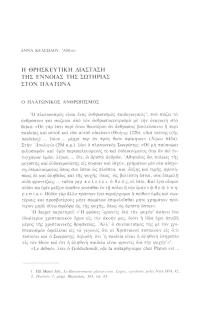
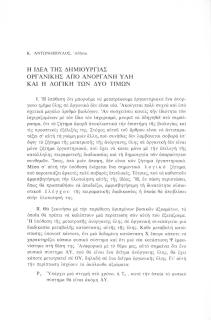
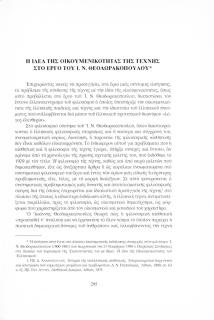
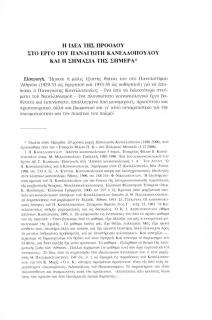
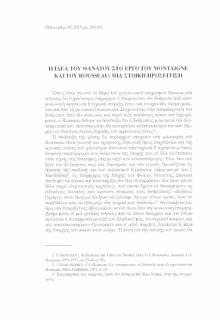
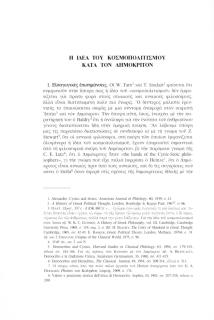
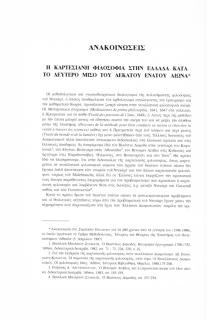
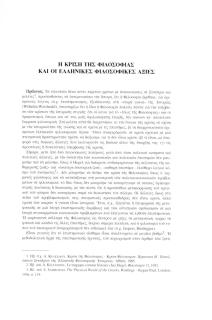
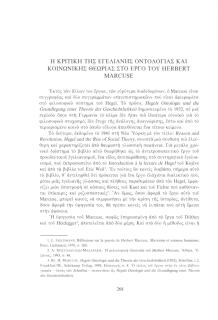
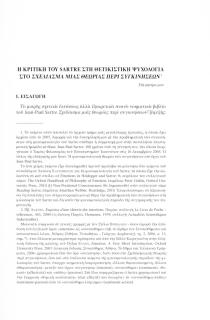 << 10
10 >>
<< 10
10 >>
Total: 4244

Η θεώρηση του αριθμού στο έργο του Nicolaus Cusanus
Ενότητα: Άρθρα του περιοδικού "Φιλοσοφία"
Δεν υπάρχει περιγραφή
Η θρησκευτική έκφανση της τεχνολογίας
Ενότητα: Άρθρα του περιοδικού "Φιλοσοφία"
The question pondered upon in this paper in whether science and technology could be claimed to be a sort of religion. In order to answer this, it is necessary to define what in fact constitutes the religious character of a certain manifestations of human life outside the action and function of religion per se. That is, in what sense and in what respect, apparently non-religious actions, institutions and symbols could in essence have a religious character and function. The conditions for this to happen are, fist, a conception of religion as a dimension, rather that a sphere of human being; secondly, a quasi-religion should be understood within secularism; thirdly, this should be distinguished from pseudo-religion; and fourthly, this should encompass a transcendent ideology. Given these, it is not in fact science, and technology that could be seen as religious forces today. It is rather a distorted conception and function of the, appearing as scientism and technisism. Only in this respect science and technology qualify as quasi-religions. Th...
Η θρησκευτική διάσταση της έννοιας της σωτηρίας στον Πλάτωνα. Ο Πλατωνικός ανθρωπισμός
Ενότητα: Άρθρα του περιοδικού "Φιλοσοφία"
Le platonisme et un humanisme pédagogique dans ce sens que l΄éducation est la voie qui sert le divin et qui assure à l΄âme humaine son salut. Interpréter la pensée platonicienne signifie ainsi tenter de décrire le «vivant itinéraire de la destinée humaine». Le salut, qui consiste dans la ressemblance avec le divin, est l΄aboutissement de l΄ascèse philosophique qui s΄exerce durant la vie ici-bas et pour la vie terrestre. L΄étude fait suite à notre livre Le concept de salut dans la pensée politique de Platon, Introduction de l΄Académicien G. Michailidès-Nouaros, éd. de l΄Académie d΄Athènes, 1982. Il nous a semblé indispensable d΄élucider le sens religieux du concept de salut, afin de compléter notre ouvrage et de ne pas trahir ou mutiler la pensée platonicienne.
Η ιδέα της δημιουργίας οργανικής από ανόργανη ύλη και η λογική των δύο τιμών
Ενότητα: Άρθρα του περιοδικού "Φιλοσοφία"
Aristotle΄s classical distinction between opposition and contradiction rests on the fact that two opposite predicates cannot both be true but can both be false (e.g. short/tall), whereas two contradictory predicates can neither be both true nor, however, both false (e.g. dead/alive). Two opposite predicates can both be false, because a third alternative, existing in between the two extremes, is always possible (e.g. of middle height). No such alternative exists between truly contradictory predicates; the two states to which the contradictory predicates are attached are the only ones possible and no intermediate state between them is conceivable. The Law of the Excluded Middle applies exclusively to contradictory predicates. The article discusses the relation between the predicates «organic / inorganic». As all matter is either of the former or of the latter category, no intermediate state being allowed between them, at least semantically, it follows that these two predicates are contradictory. This being the case, what can we rationally ...
Η ιδέα της οικουμενικότητας της τέχνης στο έργο του Ι. Ν. Θεοδωρακόπουλου
Ενότητα: Άρθρα του περιοδικού "Φιλοσοφία"
Ioannis Theodorakopoulos stressed in his philosophical work the intrinsic value of the Greek civilisation and, in particular, the universal feature of the Greek art. As he points out, Greek civilisation expresses the values of beauty, truth and liberty, as well as it combines the sensual with the spiritual, the objective with the subjective, realism with idealism by expressing the universal. The latter has been accomplished in philosophy through the use of universal concepts; the same applies to the Greek art through the conception of beauty as a general category. Hellenism has been conceived by him as the expression of the universal, a feature that unites Greek civilisation and art with Europe which has integrated the Greek values. Theodorakopoulos' argument is based on empirical truth since, as we know, from Antiquity till now the Greek civilisation is considered to express values generally accepted that invigorate continuously human civilisation. The universality of the Greek art and the Greek culture generally adopted by him is in acco...
Η ιδέα της προόδου στο έργο του Παναγιώτη Κανελλόπουλου και η σημασία της σήμερα
Ενότητα: Άρθρα του περιοδικού "Φιλοσοφία"
One of the central themes in the sociological theory of P. Kanellopoulos is the issue of historical progress. Kanellopoulos is the first to define the concept of progress, differentiating it from the concept of evolution. He distinguishes the two concepts beginning from the epistemological distinction between nature and history. Evolution refers to nature, and it is connected to the biological process, which occurs in accordance with the natural laws. Progress refers to history, and it is connected to the historical process, which occurs in accordance with the particular historical laws. Progress is the emancipation of man from the barriers of the species and of nature in general; the tendency for continuously greater liberation from the bonds of nature. Kanellopoulos differentiates between progress as a historical event and the awareness (the «idea») of progress. Progress as a historical event has existed since the emergence of historical society. But it took man a long time to become aware of this fact. The «idea» of progress came much...
Η ιδέα του Θανάτου στο έργο του Montaigne και του Rousseau : μια στωική προσέγγιση
Ενότητα: Άρθρα του περιοδικού "Φιλοσοφία"
Tant Montaigne que Rousseau se sont intéressés aussi au problème de la mort. Chacun des deux penseurs, de son côté, essaie d' interpréter ce phénomène, selon l' influence reçue par la lecture des anciens, formatrice de leur propre point de vue. Rousseau, selon P. Villey, fut influencé par la pensée de Montaigne sur plusieurs domaines: sur l' art, les sciences, l' éducation. Néanmoins, l' on constate que l' attitude de Rousseau face au problème de la mort est aussi porteuse des idées de Montaigne, qui, lui, demeure attaché plutôt à la philosophie des Stoïciens. Malgré les voies de repère différentes, les deux penseurs se rencontrent pour affirmer qu' au moment décisif du trépas, l' homme fait preuve de son propre art de vivre.
Η ιδέα του κοσμοπολιτισμού κατά τον Δημόκριτον
Ενότητα: Άρθρα του περιοδικού "Φιλοσοφία"
In this paper we showed that the political idea of cosmopolitism appears in Democritus' philosophy before the Cynics and Stoics philosophers present it in a more systematic and elaborated way. According to Democritus' belief on democracy (fr. 251) each man has two main qualities, that one of the «individual» who takes care of his personal affairs and of the «citizen» who takes a serious interest and participates actively in public affairs. People are equal (frs. 164 and 158, test. 99) since Democritus believes that wealth and poverty cannot stand as a criterion that gives them the opportunity to communicate as equal ones and constitute a social union. In fr. 247 «ανδρί σοφώ πάσα γη βατή· ψυχής γαρ αγαθής πατρίς ο ξύμπας κόσμος», which Η. Diels associates to that Thucydides refers to in his Funeral Speech (2.43), Democritus underscores that each man, owner of a virtuous soul, can visit whichever country he chooses to, since his culture and education allow him a successful communication and cooperation. Democritus' belief on the idea of cos...
Η καρτεσιανή φιλοσοφία στην Ελλάδα κατά το δεύτερο μισό του δέκατου ένατου αιώνα
Ενότητα: Άρθρα του περιοδικού "Φιλοσοφία"
A une époque où l' empirisme des Lumières est abandonné, l' influence du cartésianisme se confond avec l' histoire de la philosophie. Au XIXe siècle, les ouvrages de Descartes n' ont pas été simplement lus mais ont été amplement commentés en Grèce et on le considère comme le rénovateur de la philosophie moderne. Cependant, nous observons une méconnaissance des problèmes du scepticisme cartésien et des relations entre l' empirisme et l΄ontologie dans le système de Descartes. Les érudits grecs (N. Piccolos, Th. Kaïris, N. Vamvas, P. Vraïlas-Arménis, C. Stratoulis, N. Kotzias) ayant poursuivi leurs études de philosophie à Paris, Munich, Berlin et Leipzig, leur appréhension du cartésianisme se fait à travers les tendances philosophiques de l' époque: la philosophie écossaise, l' éclectisme français, l' hégélianisme et le système de Schelling. Une importance particulière est attribuée à l' étude de la méthode, à l' ordre respectée pour la conduite de nos pensées tandis qu' on conteste la certitude du cogito et de l' argument ontologique ainsi q...
Η κρίση της φιλοσοφίας και οι ελληνικές φιλοσοφικές αξίες
Ενότητα: Άρθρα του περιοδικού "Φιλοσοφία"
Δεν υπάρχει περιγραφή
Η κριτική της εγελιανής οντολογίας και κοινωνικής θεωρίας στο έργο του Herbert Marcuse
Ενότητα: Άρθρα του περιοδικού "Φιλοσοφία"
Avant de devenir le penseur "planétaire" que l΄on sait, Herbert Marcuse a été l΄auteur de deux ouvrages de philosophie "universitaires" consacrés au système de Hegel. Le premier, Hegels Ontologie und die Grundlegung einer Theorie der Geschichtlichkeit, publié en 1932 à un moment qui déjà en Allemagne n΄était plus favorable à la réflexion philosophique, n΄a pas bénéficié du délai nécessaire à tout écrit sérieux pour pénétrer dans le public restreint auquel s΄adresse le sérieux. Le second, Reason and Revolution: Hegel and the Rise of Social Theory, paru en 1941 à New York, fut longtemps considéré comme étant l΄ouvrage représentatif de l΄hégélianisme progressiste, une sorte de contrepoint à l΄hégélianisme conservateur représenté par l΄ Introduction à la lecture de Hegel de Kojève et par les livres d΄Eric Weil. Si on le reprend cependant aujourd΄hui on s΄aperçoit que c΄est un livre fort peu dialectique qui, à travers un langage hégélien et de multiples citations de Hegel, représente un retour vers une position kantienne et fichtéenne actualisé...

